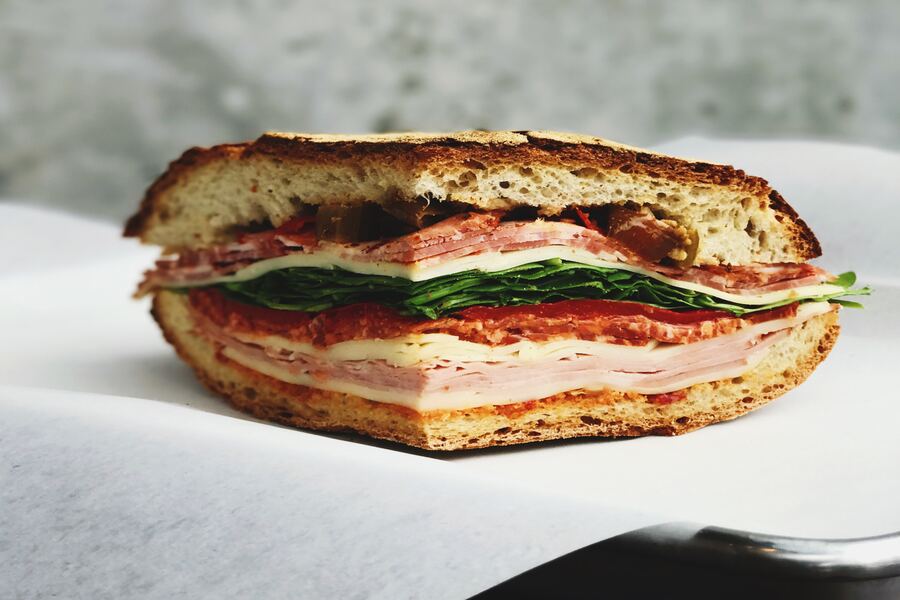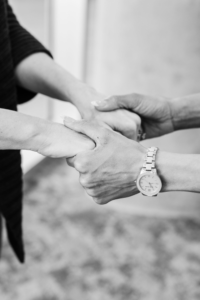Tanna’s Story:
Growing up, I found identity in my top-tier grades and volleyball skills. Luckily, this perfectionistic ideology worked well for most of my childhood. My parents were proud of me, and I was checking all the boxes as a daughter. I had believed in Jesus’ death and Resurrection for my salvation, but I was far more focused on my own life goals than on my faith. I finished my senior year volleyball season as starting libero (back row defense), and I was accepted into my college of choice with a pre-med track in sight.
At this point, I suddenly found myself unmoored. My high school grades and volleyball record no longer seemed to matter. In a desperate attempt to prove my worth, I looked for something new I could be the best at. I turned to my body, deciding to live a “healthier lifestyle.” When I cut out cookies, cakes and candy, I wanted others to see my self-discipline so I could feel I was better than the other girls around me.
I felt successful when I started hearing comments from friends and family.
“Wow, you look good!”
“What are you eating?”
“What’s your secret?”
These comments fueled a fire to push even harder. No more sweets—they signified a lack of control. No more sodas or fast food—they signified a lack of discipline. And of course my “healthier lifestyle” would require physical exercise. The demanding workouts required for a star volleyball player were no longer enough. Now I needed HIT routines (high intensity resistance training), long-distance runs and ritualistic abdominal workouts. I had a new, thin identity, and I had no intention of giving it up.
Five months down the road, my initial goals had turned into a full-fledged obsession. I worked out every day and ate a very limited amount of “clean” food. I used a calorie-counter app tracking every bite I took, relied on nutrition facts from social media and collected workout videos. Each component felt like a drug fix to make me feel better about myself. I was in love with my bony self-made prison.
By spring break of 2014, my love for anorexia nervosa had overtaken my love for family. My parents watched as their once spunky, joyful daughter became isolated, anxious and irritable. Fortunately for me, my parent’s love was unyielding. Desperate for my healing, my mom tried taking me to outpatient counselors and dieticians, and I pretended to cooperate until I headed back to school.
When I returned home at the end of freshman year, my emaciated, tired and stressed body could no longer be hidden. My parents saw a skeleton that night, and in a moment of rage and fear my father gave me two options.
“I love you too much, Tanna,” he said, “to watch you do this to yourself! And I’m tired of fighting. You either look for a recovery program and get help, or you get out of my life!”
Talk about tough love! Like God, Dad loved me too much to let me stay in my self-made prison. His harsh words woke me up. I knew I needed to escape.
Tired of food fears, constant anxiety and nagging loneliness, I began researching eating disorder treatment. The first step to enrolling in any outpatient program was having a physical exam. My hospital intake revealed my physical deterioration. A recorded heart rate less than 40 beats per minute classified me as too unstable for outpatient care.
With tears in my eyes, I looked with fear and shame at my stark reality. How had I failed so miserably? How had I let my disorder go this far? Where was I supposed to go from here? Would I have to walk through recovery alone?
Searching for higher level care at a residential facility, I turned to Google. Though there are many reputable inpatient treatment centers in Texas, God drew my attention to a center in Florida, one of the few Christian residential treatment centers for eating disorders in the US.
The day my parents and I arrived at my treatment center was one of the darkest days of my life. I was terrified to travel the unknown recovery journey away from friends and family. But I was even more afraid to be evicted from my eating disorder prison and its eerie lie of control.
Each day of recovery felt like climbing a steep cliff. Every morning I sat down with other women to face our biggest fear—food. The schedule became routine: breakfast, snack, lunch, snack, dinner, snack, bedtime. Between meals and snacks were intensive therapy sessions, medical monitoring and downtime. We were not allowed a stroll outside because our health could not handle even that mild physical activity.
This treatment structure was intense and often felt dehumanizing. Looking back on the disciplined environment of treatment, I think of Deuteronomy 6:24. The Israelites recounted that God’s commands were given “that we might always prosper and be kept alive.” In my case, the strict commands during treatment literally helped keep me alive.
In the darkness of my condition and my recovery process, God reminded me that His light scatters the darkness. During scheduled downtime, we were encouraged to spend time reading and reflecting. I considered the same questions I had asked when I finally faced my illness, and God began graciously providing answers.
How had I failed so miserably? Romans 3:23 says all have sinned, and for me, this human predicament had shown up in a terrible obsession.
How had I let my disorder go this far? Romans 6 describes slavery to sin. Although I already trusted Christ for my salvation and had been set free from sin’s mastery, I found myself in prison, ignoring my broken chains and open doors.
Where was I supposed to go from here? Would I have to go through recovery alone? Jesus specializes in redeeming broken people. Not only was I more than a conqueror through Christ (Romans 8:37-39), but I could never possibly be alone, for nothing would ever “be able to separate [me] from the love of God in Christ Jesus [my] Lord.”
I slowly began to see that God had already set me free, and He would hold my hand as we walked out of prison together.
The day I left treatment to return to Houston was scarier than I anticipated. Could I survive in the real world? Could I live out my new self without the support of my counselors and nutritionists? I was unsure how I would handle the temptation to slip back into old habits. But God reminded me from His Word to lean on His faithful promise to provide a way out from old habits (1 Corinthians 10:13). I surrendered to the same loving God leaving my treatment center as I had going there, knowing my prison cell had become a memorial stone of God’s faithful deliverance.
Ultimately, the love of my fathers saved me: the love of my dad in Texas and the love of my Father in Heaven, who sees me, knows me and never leaves me. God showed me how to treat my body as a temple (1 Corinthians 6:19), and He continually reminds me how much He loves the whole me: soul, spirit and body.
My life in this body is God’s beautiful creation for His glory. In God’s kindness, I now serve as a Physician’s Assistant treating patients with eating disorders—helping other women experience the sweet freedom God has given me.


